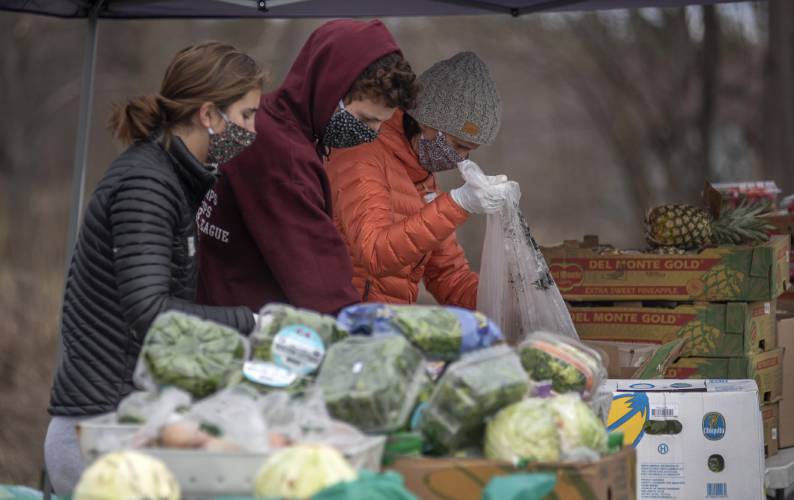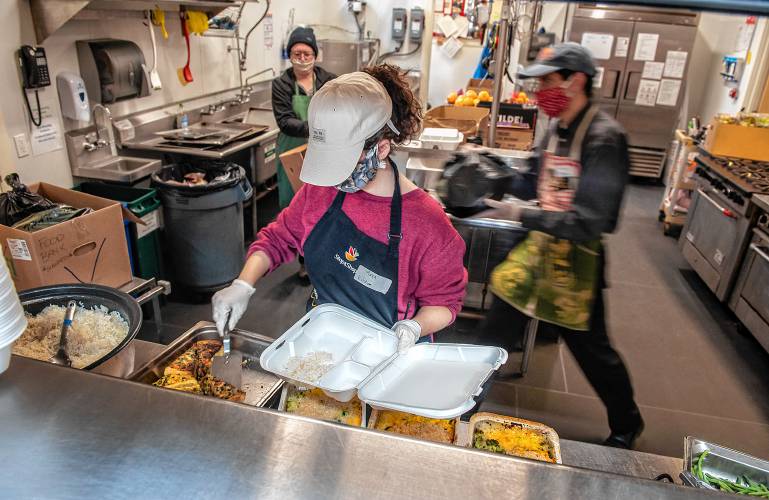June 11, 2020 Community Stories
Meeting Urgent Needs for Food
Pre-pandemic, the Amherst Survival Center was bustling as a vibrant community meeting place, open to everyone. The Center met basic needs, serving meals, providing groceries, running a clinic, acting as a resource center, and hosting community activities.
“We serve a really broad swath of people—your neighbors,” says executive director Lev Ben-Ezra. “Many folks are working, some are unemployed or underemployed; we serve seniors on fixed incomes and people with disabilities; farmers, immigrants and refugees. Really everyone.”
The Center is open to all, and primarily serves residents of Hampshire and Franklin Counties. The Food Pantry is available to residents of 13 towns including, Amherst, Belchertown, Deerfield, Granby, Hadley, Leverett, Pelham, Shutesbury, South Deerfield, South Hadley, Sunderland, Ware and Whately, as well as anyone who is currently homeless.
When COVID-19 hit, Ben-Ezra said her staff quickly realized that they’d have to make big changes, both for everyone’s safety and to meet their community’s most urgent need: food. Before COVID-19, the Center hosted a daily breakfast bar and hot lunch, and a weekly dinner. Community members could also make a full grocery shop monthly the Center’s Food Pantry, and monthly pick up fresh produce and bread daily during the Center’s open hours.

Suddenly the requests for daily lunches doubled; registration for the Center’s food pantry quadrupled. “We were seeing people we had never seen before,” says Ben-Ezra. But the Amherst Survival Center was no longer able to serve sit-down meals or operate its food pantry as it normally would.
“The people we serve are resourceful and resilient; they’ve been through a lot. But this pandemic has really rocked all of us,” says Ben-Ezra. “Not only are people impacted by unemployment and underemployment, and worried about health, but social isolation means that many support networks people rely on for rides, for example, have been disrupted. A person whose normal grocery routine relies on coupons and shopping at five or six grocery stores can no longer do that. It’s not safe.”
Now, pre-packaged to-go meals are distributed daily, along with bread and produce, at a station right outside the building. The pantry has changed its model from drop-in shopping, now assembling boxes full of canned goods, grains, fresh milk, eggs, cheese, meat, produce, toiletries, hygiene products and pet food that can be picked up in its dining room— with safe social distancing. The Center is also offering no-contact curbside pickup and grocery delivery to anyone who is ill, disabled, or has transportation issues.

The Amherst Survival Center gratefully accepted a grant from the COVID-19 Response Fund for the Pioneer Valley, hosted by the Community Foundation of Western Massachusetts. With the grant, Ben-Ezra said, “We purchased food. We bought to-go containers. We acquired equipment for our outdoor distribution— tents, coolers, and shelving. We are now able to accept more perishable food donations because we’ve been able to purchase additional refrigeration.”
“We’re so unbelievably grateful for the Foundation’s swift response in this crisis, and the flexibility of that support. This crisis has required such significant levels of creativity and innovation. Those contributions have enabled us to continue responding with flexibility.”
